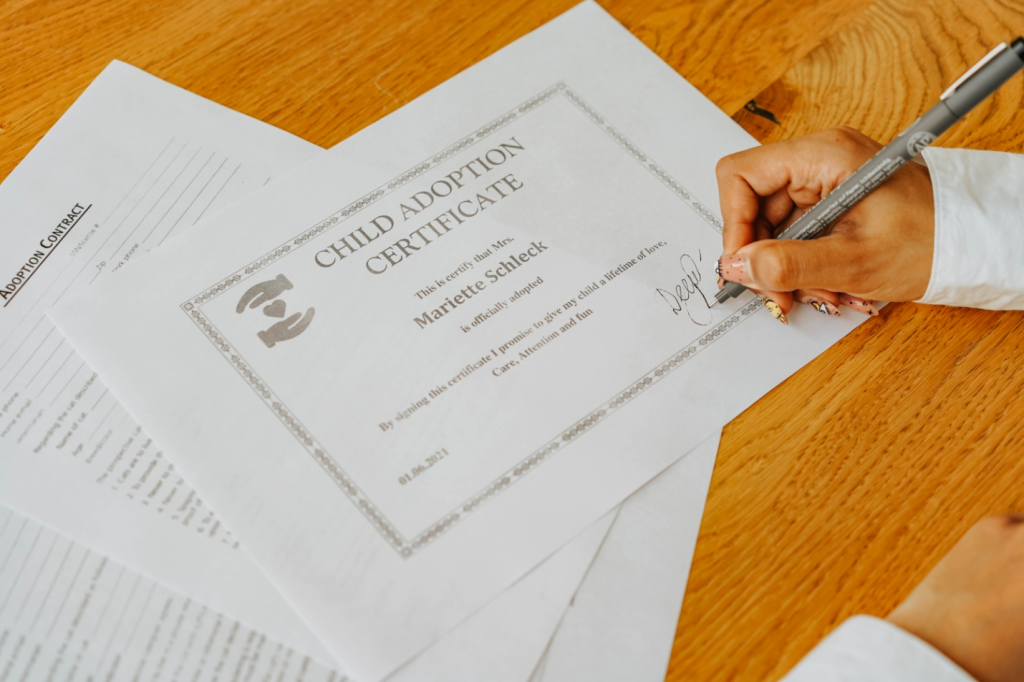Adopting a child is one of the best ways to create a family and care for a child. A decree of adoption is a legal document that reflects the final stage of the adoption process. It recognizes the child’s legal status as a part of the adoptive family. It also terminates any prior parental rights and responsibilities of the biological parents regarding the child. Adoption Decrees hold a lot of weight, and it is essential to understand them.
In this post, our child adoption lawyers in Houston explore common modifications in adoption decrees and how they may affect adoptive families.
What Is an Adoption Decree?
An adoption decree is a court order entered by the family court judge, formalizing the completion of the adoption process. It outlines the basic details of the adoption process, including:
- The date of the hearing
- The names of the adoptive parents
- The child’s new name
It also establishes the parental rights and responsibilities of the adoptive parents and terminates the rights of the biological parent(s).
The Importance of Understanding Adoption Decrees
Adoption is a beautiful process that can bring parents and children together in a rewarding and transformative way. However, there are many legal hurdles that adoptive parents must navigate to complete their adoption successfully.
Understanding adoption decrees is essential to successfully navigate the legal system and establish the child’s legal status as your own. As a new parent, there are many legal documents you will need to deal with, and understanding the basics will help ensure everything goes smoothly. Adoptive parents who understand the adoption decree’s specific language and requirements will feel more comfortable knowing they have complied with the law.
8 Common Modifications in Adoption Decrees
1. Change of Name
Adoption decrees commonly include a name change for the adopted child. However, there may be instances where the child or their adoptive parents wish to change the name again. This may be for a personal choice or other reasons, such as adoption disruption. A motion to modify the adoption decree may be filed in these cases. The court may approve the name change if deemed necessary and in the child’s best interest.
2. Visitation and Contact
In some adoption cases, the biological parent(s) may request visitation or contact with the child. The court may order visitation or contact and include details on facilitating this. Adoptive parents may also request modifications to the visitation arrangements. The court generally prioritizes the child’s best interest when deciding on visitation and contact modifications.
3. Child Support
Child support modifications may be necessary if birth or adoptive parents experience significant financial changes or other significant changes in circumstances, such as a change in custody or increased visitation. Parents may file a motion with the court requesting a child support modification. However, both parties must be informed about their legal responsibilities regarding child custody and support.
4. Open Adoption
An open adoption is one in which the birth parents and adoptive parents maintain an ongoing relationship with each other after the adoption has been finalized. This arrangement can benefit both parties as it helps create a sense of stability and continuity for the adopted child while also providing support and guidance for both sets of parents.
5. Termination of Parental Rights
Termination of parental rights may be necessary if the biological parent has failed to meet their parental responsibilities, including neglect or abuse of the child. Adoptive parents may also request termination if the biological parent fails to maintain contact or is absent from the child’s life for an extended period. Termination of parental rights is a significant legal proceeding that requires the services of an experienced adoption attorney.
6. Custody Modifications
Custody modifications may be necessary if significant changes in circumstances occur, such as a relocation of the adoptive family or issues with the biological parent. Adoptive and biological parents may file motions to modify custody if there are issues of significant concern. The court may then assess the circumstances and alter the custody agreements as necessary.
7. Financial Support
Some adoptions involve financial support from one or both parents, either through direct payments or medical insurance coverage. An agreement regarding financial support can be included in an adoption decree if either party desires, although this is only sometimes necessary or appropriate in every situation.
8. Relocation Rights
If either set of parents plans to relocate after the adoption has been finalized, relocation rights may also need to be addressed in the decree. These rights typically outline steps before either parent can move away with the child, such as giving notice and allowing time for visits, if possible, before moving away permanently.
The Role of Child Adoption Lawyers in Understanding Adoption Decrees
The role of an experienced child adoption attorney is to help adoptive parents navigate the legal system and to ensure that their adoption proceedings are legal and in compliance with all applicable laws. They will provide the necessary legal guidance and support to help you understand your rights and responsibilities and the legal requirements for completing your adoption. With the help of a family lawyer, you can confidently understand the adoption decrees and avoid any legal mishaps.
What Happens if There Are Issues with the Adoption Decree?
In some cases, problems with the adoption decree may require modifications or further legal action. If this happens, having an experienced child adoption attorney by your side is essential to provide guidance. They will help you understand the issues and take the necessary steps to correct them. They can also represent you in court to seek the necessary orders to resolve disputes.
Understanding the adoption decree and ensuring that it is legally binding is crucial, and having the help of an experienced adoption lawyer can be the difference between success and failure. Don’t hesitate to contact an adoption attorney for assistance with your adoption proceedings.
Adoption Decrees are significant legal documents for both adoptive parents and their children. Parents must understand the basics and ensure their adoption complies with the law. This is why it is so important to have a qualified adoption attorney to assist with the legal aspects of the adoption process. With an attorney’s help, you can confidently navigate the legal system and ensure that your adoption decree reflects your wishes fully. Feel free to seek legal assistance from an experienced adoption lawyer to achieve your adoption dreams.
Looking for a Child Custody Lawyer? Get in Touch with Us Today!
Modifying an adoption decree is a complex process that requires thoughtful consideration and a deep understanding of the legal system. Individuals must work with experienced child adoption attorneys to navigate the legal system and ensure the best outcome for all parties involved.
Parents should always prioritize the child’s best interest when seeking modifications to adoption decrees. By learning about common modifications, individuals can make informed decisions and navigate this emotional journey with clarity and confidence.
If you need any help with the adoption process, please contact Daniel Ogbeide Law today. Our qualified family lawyers in Houston can help you navigate the complexities of adoption and provide expert advice on how to proceed.
Disclaimer: This article is only intended for educational purposes and shouldn’t be used as a substitute for legal advice.




